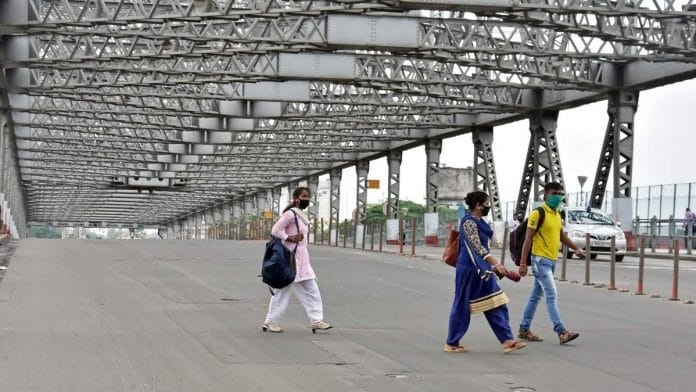New Delhi: Politics over development is coming to a boil in West Bengal, with the BJP hoping to topple Mamata Banerjee’s two-term Trinamool Congress government in the assembly elections set to be held in just a couple of months. But the fact is that on many human development indicators, the state is not just above the national average, but also above states like Gujarat and Madhya Pradesh that have long been ruled by the BJP.
The 15th Finance Commission’s report, submitted to the central government last November and made public last Monday, has highlighted Bengal’s social indicators, but also said the state has a lot of catching up to do on the fiscal front.
Due to high past debt, the report says, West Bengal is fiscally stressed and interest payments are a huge liability on the state government. It has one of the highest interest burdens in the country, along with Punjab. Between 2012-13 and 2018-19, interest payment as a percentage of total revenue expenditure has been in the range of 18-23 per cent.
Also read: Modi rally, infra projects, month-long yatra — BJP sets in motion its grand Bengal plan
Where Bengal does well
The Mamata Banerjee-led Trinamool Congress government has performed well on most social indicators, including education, nutrition, health, sex ratio, availability of safe drinking water, and toilets.
Bengal’s literacy rate is 76.3 per cent, as against the national average of 73 per cent.
Infant mortality rate (deaths per 1,000 live births) is 22 per cent as against the all-India figure of 32 per cent. In contrast, BJP-ruled Madhya Pradesh has adverse social indicators — its infant mortality ratio is the highest in the country, the report notes.
The percentage of underweight children in Bengal is 31.6 per cent, as against 35.8 per cent nationally, while the figures for stunting among children are 32.5 per cent and 38.4 per cent, respectively. On the nutrition parameters, many states including BJP-ruled Gujarat performed worse than the national average.
West Bengal also rates well in providing safe drinking water and toilets — 94.6 per cent households have safe drinking water, as against 89.9 per cent nationally, while in the case of toilets, 74.9 per cent households have at least one, as against 61.1 per cent nationally.
The report adds that with an SDG (Sustainable Development Goal) Index of 60 — on par with the rest of the country — West Bengal was ranked 14th among 28 states in 2019. The SDG Index is prepared by federal think-tank NITI Aayog, and tracks the progress of all states and union territories on 100 indicators drawn from the Ministry of Statistics and Programme Implementation’s National Indicator Framework.
According to the Finance Commission, Bengal has taken “significant steps” in the implementation of e-governance measures to simplify tax returns. It offers “vast and unexploited tourism potential (for both domestic and foreign visitors), which could be exploited to expand employment opportunities and spur economic growth”, the report states.
Economist and activist Prasenjit Bose, however, says the state’s performance on social indicators is mixed. “West Bengal has been a middle ranking state even before the Trinamool government. No substantial improvement has occurred on socio-economic indicators during the TMC rule.”
The state’s gross enrolment ratio for higher secondary education — 50.9 per cent, lower than the all-India level of 55.4 per cent — is one such indicator.
Also read: ‘Will suffer Mamata misrule, not BJP’ — Bengal intellectuals don’t want another ‘poriborton’
Worrying performance of PSUs
The Finance Commission has also pointed out the below-par performance of state public sector undertakings (PSUs). As of 31 March 2017, 73 of the 92 PSUs are working, while the other 19 are non-functional.
“Employing around 47,000 employees, the total turnover of these working state PSUs was 89.4 per cent of the aggregate investment of Rs 39,443.4 crore. The return on equity in these entities stood at -1.77%,” the report states.
Bose adds that it’s more glaring that for the past three years, the state government has not submitted the audit report of the PSUs’ performance in the assembly. “No one knows how much the government has invested in the PSUs, how much employment have they generated. The report clearly indicates that the government is neglecting the PSUs.”
Fiscal reform
The Finance Commission has recommended that Bengal needs a comprehensive fiscal reform agenda to ensure a sustainable stream of improved resources by investing in durable capital infrastructure.
State capital Kolkata lags behind in investment as compared to other metros, attracting only 1 per cent of the total Foreign Direct Investment in India. The Finance Commission recommended that the state could attract more FDI, particularly in high technology areas such as artificial intelligence and machine learning.
Bose also points to Bengal’s high debt as a matter of concern. “It’s a legacy issue. Unfortunately, the Finance Commission does not seem to offer any immediate solution in terms of lessening the debt burden of the state.”
Also read: Budget puts roads in focus in poll-bound states, Bengal & Assam tea workers get welfare push






